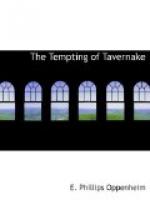“I was never spoilt with compliments,” she said. “You see, I had a beautiful sister.”
The words seemed to have escaped her unconsciously. Almost as they passed her lips, her expression changed. She shivered, as though reminded of something unpleasant. Tavernake, however, noticed nothing. For the greater part of the day he had been sedulously fighting against a new and unaccustomed state of mind. He had found his thoughts slipping away, time after time, until he had had to set his teeth and use all his will power to keep his attention concentrated upon his work. And now once more they had escaped, again he felt the strange stir in his blood. The slight flush on his cheek grew suddenly deeper. He looked past the girl opposite to him, out of the restaurant, across the street, into that little sitting-room in the Milan Court. It was Elizabeth who was there in front of him. Again he heard her voice, saw the turn of her head, the slow, delightful curve of the lips, the eyes that looked into his and spoke to him the first strange whispers of a new language. His heart gave a quick throb. He was for the moment transformed, a prisoner no longer, a different person, indeed, from the stolid, well-behaved young man who found himself for the first time in his life in these unaccustomed surroundings. Then Beatrice leaned towards him, her voice brought him back to the present—not, alas, the voice which at that moment he would have given so much to have heard.
“To-night,” she murmured, “I feel as though we were at the beginning of new things. We must drink a toast.”
Tavernake filled her glass and his own.
“Luck to you in your new profession!” he said.
“And here is one after your own heart, you most curious of men!” she exclaimed, a few seconds later. “To the undiscovered in life!”
He drained his glass and set it down empty.
“The undiscovered,” he muttered, looking around. “It is a very good toast, Beatrice. There are many things of which one might remain ignorant all one’s life if one relied wholly upon one’s own perceptions.”
“I believe,” she agreed, “that if I had not appeared you were in great danger of becoming narrow.”
“I am sure of it,” he answered, “but you see you came.”
She was thoughtful for a moment.
“This reminds me just a little of that first dreary feast of ours,” she said. “You knew what it was like then to feed a genuinely starving girl. And I was miserable, Leonard. It didn’t seem to me that there was any other end save one.”
“You’ve got over all that nonsense?” he asked anxiously.
“Yes, I suppose so,” she answered. “You see, I’ve started life again and one gets stronger. But there are times even now,” she added, “when I am afraid.”
The mirth had suddenly died from her face. She looked older, tired, and careworn. The shadows were back under her eyes; she glanced around almost timorously. He filled her glass.




